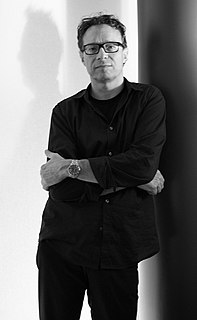A Quote by Tom Hiddleston
I think, actually, that it's a really fascinating time in history because the development of modern technology and the photographs the satellites were taking from space were mapping the earth in a new way, making us feel like the globe we inhabit is much smaller than previously conceived of, in the human mind.
Related Quotes
When we started on 'Coraline,' there was a whole host of things that we had no idea how we were going to do. Because we were making films in a way that had never really been done before, we were taking this hundred-year-old art form and bringing it into a new era by embracing technology and innovation.
Innovation, sending civilians to outer space, mapping the mind, curing cancer - all these things, they're great. Obviously these same companies are also making a lot of money and accumulating a lot of our data at the same time, which seemed like independent things and one is beneficial and one is problematic for us as individuals, but in the rush of the new I think a lot of the philosophical, ethical, moral, and legal questions don't get asked in time. It's not in our nature to pause, sit, meditate, question, debate. We move forward. Technology generally answers itself with more technology.
The apologists for space science always seem over-impressed by engineering trivia and make far too much of non-stick frying pans and perfect ball-bearings. To my mind, the outstanding spin-off from space research is not new technology. The real bonus has been that for the first time in human history we have had a chance to look at the Earth from space, and the information gained from seeing from the outside our azure-green planet in all its global beauty has given rise to a whole new set of questions and answers.
I do think the smaller-scale studio works have that incredible love of data crunching, whereas I would say the large-scale earthworks tend to be much more stripped-down. With the mappings, as connected as they are to a much more analytical idea, what's a map? And can I make a map about time? I think the first time was Hurricane Sandy, the flood plane; a moment in time, but indelibly marked on any of us who were in the city. Mapping time is something that I'm really interested in.
When Russians were having troubles, the Space Shuttle supported the Space Station Mir bringing up much needed supplies and replacements, critical spares, really. That they were able to keep their space station going for much longer than they would have without us. So, I think that shows the value of international cooperation.
A lot of the people in history who I really admire lived before the hyperinformation age we're living in. Even if they were governing or solving problems in consequential periods, like the Civil War or the world wars or the Great Depression or the Cold War, they had a period of time and space to actually think, to be private and you read their biographies, and they had time to think about what was happening and how to respond. I don't think human nature has changed in the last 50-150 years, but the stresses, the demands on those of us in public life have just exploded.
It's really fascinating. I've never spent time in a place where they lost the wars, so it was interesting and I didn't know much about the history of the country. I didn't know they were under communist rule until the nineties. It's this whole attitude of being defeated, and frowning on optimism and American way of thinking. If we were laughing, Hungarian kids would be like "You're so American."
This is the birth of the modern human soul. The artists are like us, not like the Neanderthals, who had no culture - and who incidentally were still roaming the landscape at the time the paintings were made. It is striking that there is a distant cultural echo that seems to reach all the way down to us, over dozens of millennia.
I think that in a weird way, as technology gets more sophisticated, people have become less aware of it. It's become part of our day to day life. We're seeing large-scale projection mapping, like on buildings. There's video everywhere. It's much less noticeable that we're actually looking at technology.
Japanese train signs, station signs, are really representative of the Japanese mind to me, because it always has the station where you are, the station you were previously at, and the station that is the next station. When I came to New York, I was very confused. It just doesn't say where I was and where I was going. But I realized after a while probably most people don't need to know what station you were previously at. But I think it's just some weird Japanese mentality that we need to know, we need to connect the plot.




































